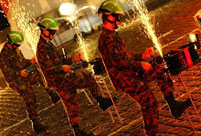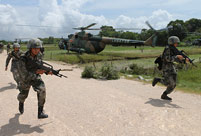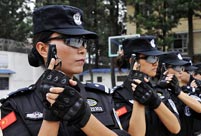 |
| Illustration: Liu Rui/GT |
US President Barack Obama's staying order, announced on August 31, does not mean stepping back from war. With or without congressional backing, Obama is determined to punish Bashar al-Assad's regime for its alleged use of chemical weapons.
Washington has no intention to seek a UN Security Council mandate, which it will not get anyway due to the position taken by Russia and China. Thus a strike against the Syrian government and military targets continues to look likely. What is less certain is what kind of strike, with what aims and what sort of strategy.
Virtually everyone in the US excludes the possibility of an Iraq-style ground invasion followed by a military occupation of Syria.
Obama has talked about a limited campaign. Pentagon planners are said to be looking at cruise missiles based on US ships in the eastern Mediterranean and at US aircraft stationed in Turkey. These could destroy a range of Syrian targets even without entering the country's airspace or risking a single American life. Some experts suggest, for example, totally knocking out the Syrian air force.
Save for the very important support from Hezbollah, Assad will be fighting alone. Moscow has recently decided to put off the delivery of fighter aircraft to Syria, and even before that had put on hold the transfer of the highly effective S-300 air defense system.
All his many disagreements with the US notwithstanding, Russian President Vladimir Putin does not want a head-on confrontation with Washington. Neither Iran nor Hezbollah are expected to launch attacks against US targets or Israel in response to the US limited strike.
The problem with this limited option is that it will not necessarily lead to regime change in Damascus.
Obama has said the US does not seek the toppling of the Assad regime by military means, but this sounds disingenuous, since Assad's removal has been Washington's precise goal in Syria for a long time.
A slap on the wrist that leaves Assad in power and does not turn the tide on the battlefield in favor of the opposition would strengthen Damascus, and expose Obama as a paper tiger.
Obama's limited approach is dictated by his own political limitations. However, once the US actually uses force against Syria, a different strategic logic will start dictating things. "Limited" strikes will have to be repeated to become militarily meaningful.
The scenario Obama has presented to the world looks like then US president Bill Clinton's 1998 strikes against Iraq, but the reality may be that of an incremental, yet steady escalation of Vietnam-style US involvement.
If this eventual US military strategy in Syria appears risky, the political strategy is even more problematic. Getting rid of Assad may be difficult, but it is the easiest of the tasks facing Washington in Syria.
Syria has been divided into many enclaves, ruled by forces deeply hostile to one another. Whatever happens to Assad, the Iranian connection to Syria's Alawites and, more importantly, Lebanon's Hezbollah is unlikely to wither away.
As to Assad's foes, some of them, allied to Al Qaeda, are much more dangerous to the US and its interests than the current Syrian government has ever been.
In a conflict increasingly dominated by the Shia coalition of the Alawites and Hezbollah on the one hand, and the Sunni allies and affiliates of Al Qaeda on the other, making sure that a pro-Western secular and democratic force emerges as the winner will be tough.
Obama's "red line" rhetoric was not directed at Syria alone, but equally, or even more, at Iran. The recent election of Hassan Rouhani as Iran's president has opened a fresh opportunity for dialogue between Washington and Tehran.
A direct US intervention in Syria, where Iran has important interests, may limit or even foreclose that option.
Turning Syria into a war by proxy between the US- and Gulf-supported Sunni forces and the Shia-Alawite coalition backed by Iran would put the conflict onto a truly regional level.
There is no question that the use of chemical weapons, especially against innocent civilians, is a heinous crime. It stands to reason that those responsible for such a crime should answer for their actions.
However, an unconvincing case for swift punishment, either leaving the presumed perpetrators in place, only slightly bruised, or inviting the US to join a sectarian war in a Muslim country, should be dismissed.
Instead, establishing the truth about the attack should be the first step in the search for a political settlement in Syria. Pushing back another Geneva conference proudly announced by the US and Russia last May will only result in many more casualties in Syria. For the victims, whether they die by chemical or conventional weapons makes little difference.
 Int'l Military Music Festival kicks off in Moscow
Int'l Military Music Festival kicks off in Moscow Army aviation brigade in actual-troop drill
Army aviation brigade in actual-troop drill Top 10 Chinese provinces for the well-heeled
Top 10 Chinese provinces for the well-heeled  Baby born to save his sister - the story of a savior sibling
Baby born to save his sister - the story of a savior sibling Lady of mystery: Female SWAT team in prison disclosed
Lady of mystery: Female SWAT team in prison disclosed  Single mother, baby live in KFC restaurant for months
Single mother, baby live in KFC restaurant for months Fan Bingbing poses for Malaysian magazine Citta Bella
Fan Bingbing poses for Malaysian magazine Citta Bella Zhang Xinyi covers COSMOPOLITAN
Zhang Xinyi covers COSMOPOLITAN A collection of bizarre rooftop buildings around China
A collection of bizarre rooftop buildings around China Putin intimate contacts with marine animals
Putin intimate contacts with marine animals China, U.S. conduct joint anti-piracy drill
China, U.S. conduct joint anti-piracy drill  'Abandoned' life in cement boats in Huai River
'Abandoned' life in cement boats in Huai River 2013 Taiwan Int'l Tourism Expo kicks off in Taipei
2013 Taiwan Int'l Tourism Expo kicks off in Taipei Photo story: Take a gap year
Photo story: Take a gap year Nokia's Global Headquarters: visiting a declining empire
Nokia's Global Headquarters: visiting a declining empireDay|Week|Month